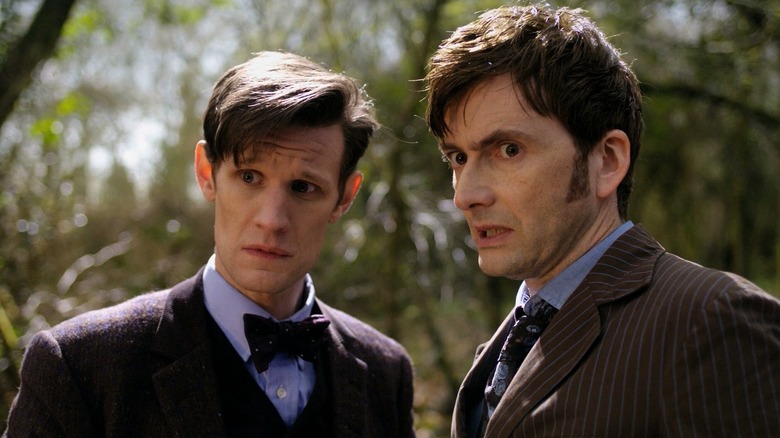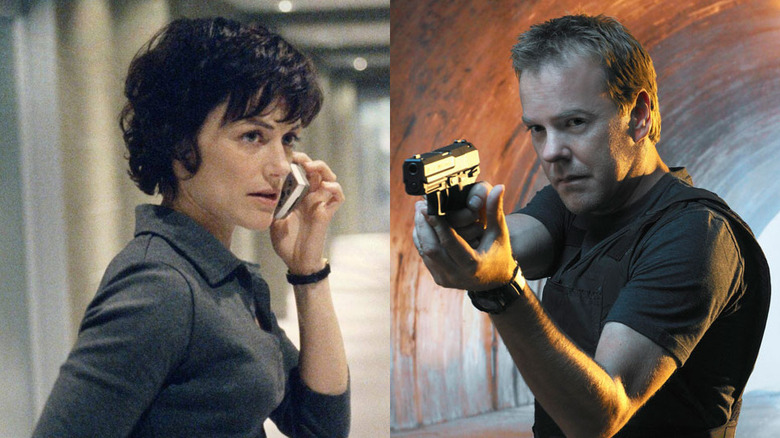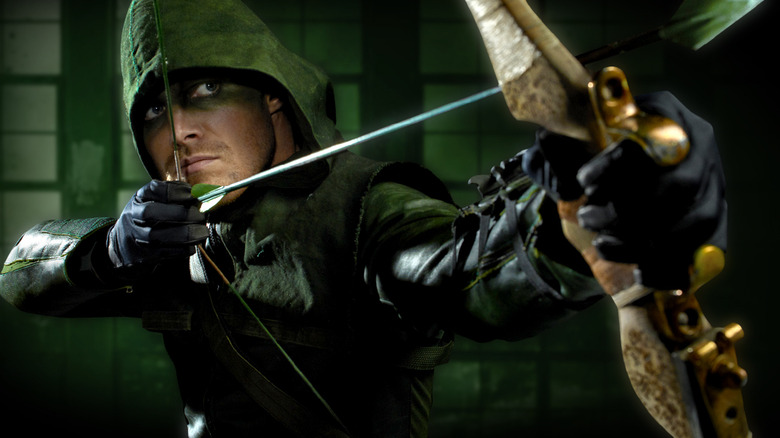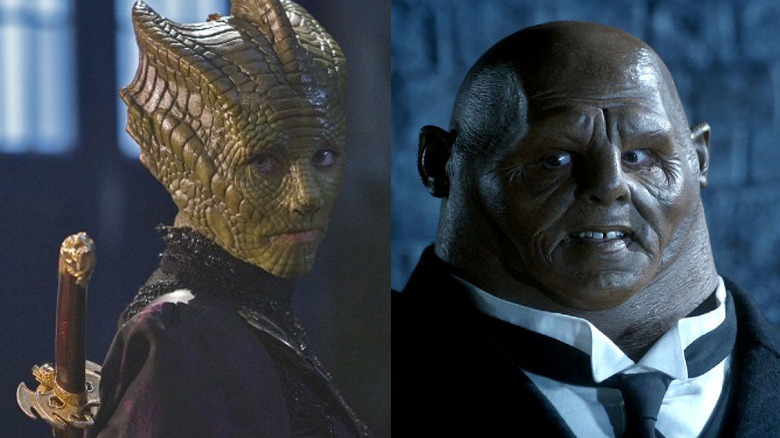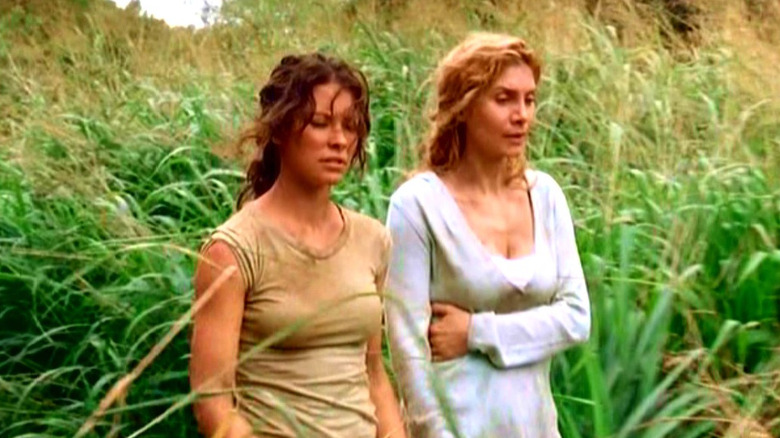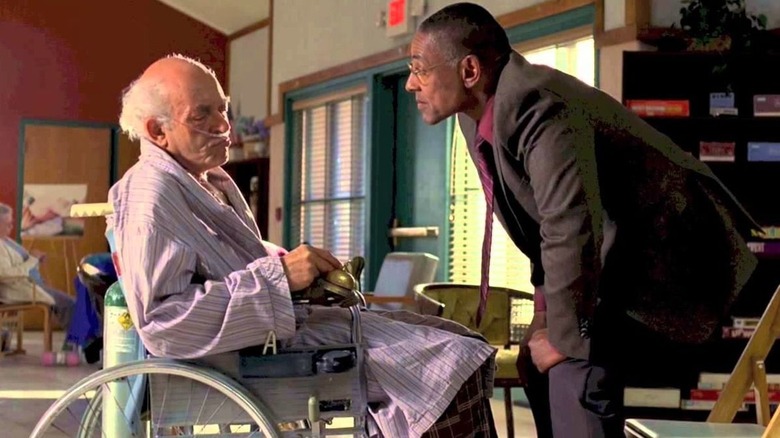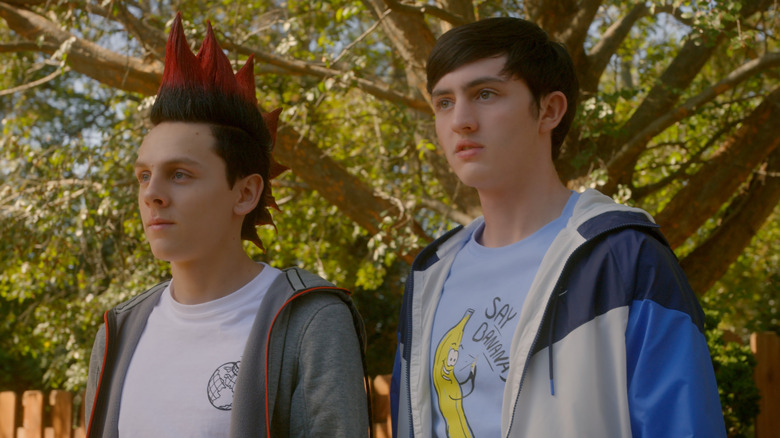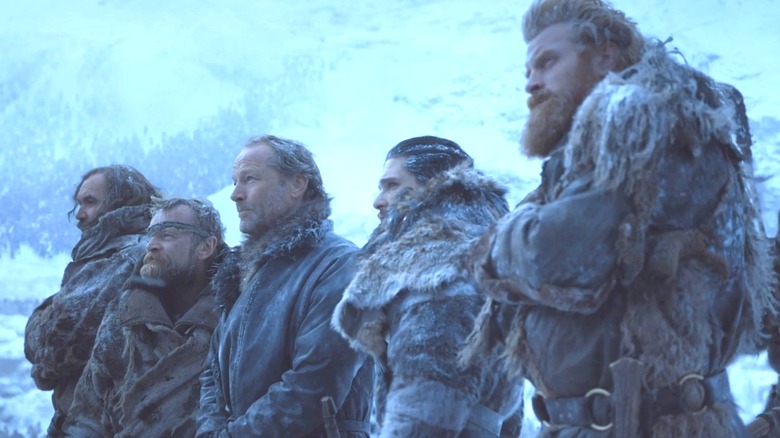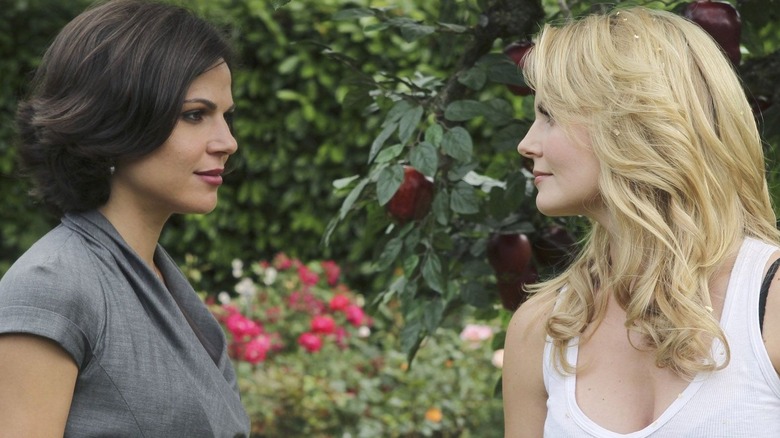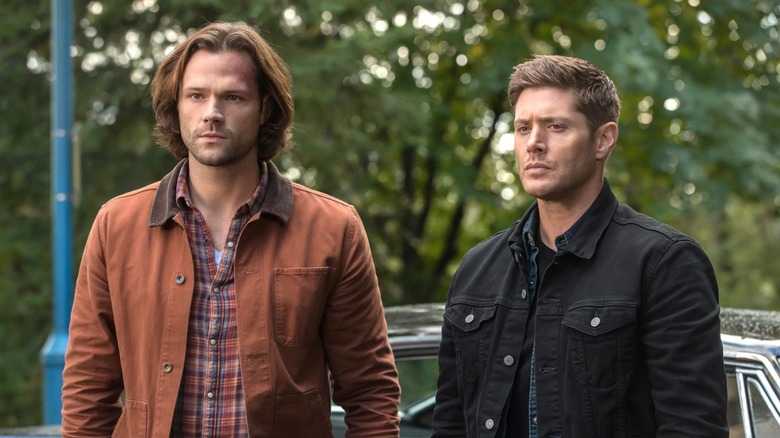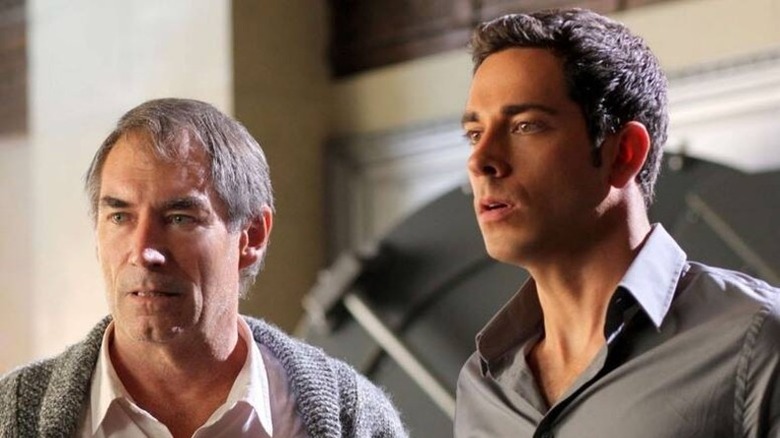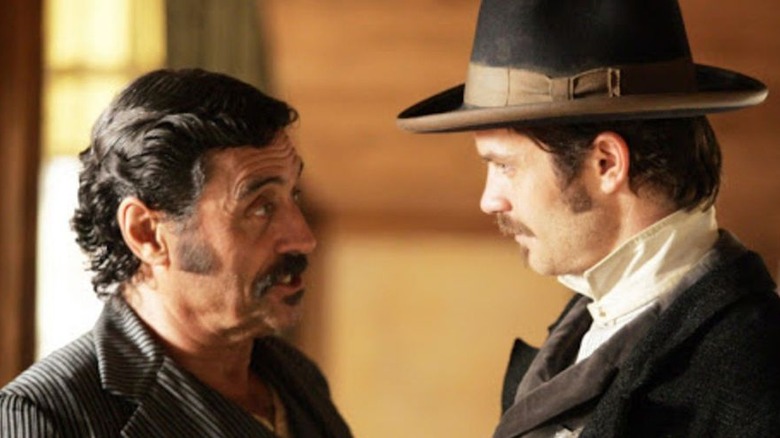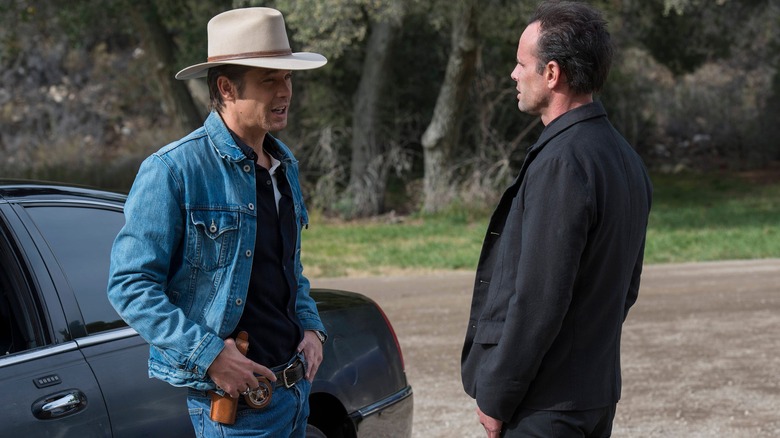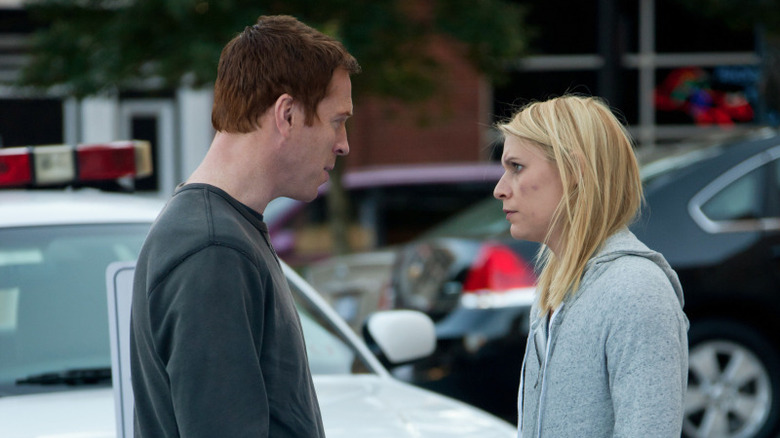The Best Good Guy-Bad Buy Team-Ups In TV History
You know what good guys and bad guys both hate? Having to work with each other to achieve a common goal or defeat a common enemy. You know what TV audiences love most? Watching the good guys and bad guys team up. When done right, these situations — in which the dynamic between opposing forces is absolutely flipped on its head — can make for some of the most entertaining episodes of a given series.
Of course, it's not always quite so black and white. We rarely see pure villains, utterly devoid of redeeming qualities and with zero positive aspects. Even Disney villains can be relatable. By the same token, most of our heroes are flawed, with their own demons or skeletons in their closets. It's what makes them sympathetic and human; it's pretty hard to find common ground with a flawless paragon of virtue when viewers, as humans, all have flaws ourselves.
Nevertheless, there's something about seeing opposing sides forced to work together in order to accomplish something both desire. Depending on the premise, it could mean some hilarious banter, the highest emotional stakes imaginable for the characters involved, or the greatest pathos evoked within the viewing audiences. One thing we know for sure: we love it. Here are some of the best good guy-bad buy team-ups in TV history.
Jack Bauer was forced to work with Nina Myers in Season 2 of 24
The creators of acclaimed action thriller series "24" sure didn't make it easy for series lead protagonist Jack Bauer (Kiefer Sutherland). For starters, he pretty much never gets to sleep. Have you ever tried sleep? It's the best! Then his pregnant wife Teri (Leslie Hope) and daughter Kim (Elisha Cuthbert) — with whom he only recently reunited following a six-month separation — are kidnapped in connection to an assassination plot he's supposed to help stop as director of the Counter Terrorism Unit. And while he stops not one but two attempts on the life of presidential candidate David Palmer (Dennis Haysbert), he doesn't get the enjoy the satisfaction of a job well done because his second-in-command Nina Myers (Sarah Clarke) turns out to be the mole hamstringing his team all along. Oh, and she kills his wife and unborn child.
But the writers don't stop there: they twist the knife by forcing Jack to actually work with Nina in Season 2! Newly elected President Palmer has to tell Jack that he's going to have to pardon Nina because she has intel they need if they're going to stop a terrorist group from detonating a nuke in Los Angeles, California. After gaining the upper hand after a plane crash, she has the audacity to demand another pardon because she plans on killing Jack — and he tells Palmer to take the deal!
Thankfully Nina was captured once more in Season 3 of "24" and Jack shot her as she attempted to escape, finally avenging his murdered family members. We're sure it didn't keep him up at night.
Good and bad team up multiple times in Arrow
There's plenty of gray area when talking about the good guys teaming up with the bad guys on CW's "Arrow." For starters, Detective Quentin Lance (Paul Blackthorne) is ostensibly a good cop, but he's also a Season 1 antagonist, whereas Oliver Queen (Stephen Amell) is a vigilante fighting crime outside the law — read: a criminal — but he's the series protagonist. Despite the fact that it's Quentin's mission to bring in the as-yet unnamed hooded vigilante, the two work together — with Quentin's part more begrudging — and Oliver even gives Quentin a phone so he can contact him.
A much more clear-cut case of good and bad teaming up comes in Season 2 of "Arrow." When Slade Wilson (Manu Bennett) shows up in Star City and starts creating a bunch of Mirakuru-powered hechmen with super strength, Team Arrow must ask for help from an unlikely source: the League of Assassins. Yes, that League of Assassins; does anyone need help figuring out who are the good and bad parties in the scenario or can we rely on the idea of nominative determinism for this one? Oliver and company must team up with Nyssa al Ghul (Katrina Law), daughter of Ra's al Ghul and former lover of Sara Lance (Caity Lotz), and her crew to take down Slade's soldiers in order to prevent A.R.G.U.S. director Amanda Waller (Cynthia Addai-Robinson) — ostensibly on the side of good, mind you — from bombing the city to keep them contained. No pressure.
There are plenty of bad guys to choose from when it comes to Doctor Who
When it comes to seminal sci-fi series "Doctor Who," there is a seemingly endless supply of alien enemies, from classic bad guys like the Daleks and the Cybermen to relatively newer villains like the Weeping Angels, The Silence, or the Headless Monks. After all, there are more than a dozen iterations of the long-running show's central character as well, which means there are a lot of good guys and a lot of bad guys from which to choose.
In the seventh episode of the relaunched series' sixth season, an installment entitled "A Good Man Goes to War", The Doctor (Matt Smith) gets help from several former enemies in the Silurians, the Judoon, and a single Sontaran named Strax. All of these races had previously banded together, with the Silence, Daleks, Cybermen, and more to fight their common enemy, The Doctor, in an attempt to lock him away through history in the first half of the two-part Season 5 finale, an episode entitled "The Pandorica Opens." One season later and the Judoon, Silurians and Strax all owe The Doctor a debt so they show up as reinforcements as he tries to rescue Amelia Pond (Karen Gillan) from The Church, alongside her husband Rory Williams (Arthur Darvill). While The Doctor had previously found his interests temporarily aligned with his enemies in the past, this team-up was one of the few not centered on overlapping self interests and the enemy-of-my-enemy trope.
Viewers get Lost when it comes to alliances and changing sides
While viewers continue to be outraged by the ending of "Lost," there's no denying the supernatural-sci-fi drama series gave us tons of complex characters with constantly shifting moral barometers. As such, it's not always easy to pin down a classic good guy teaming up with the bad guy scenario, depending on where the given characters are in their respective arcs. But, since the Survivors vs. Others conflict was a big part of the show, there's a really fun example in Season 3 of "Lost."
In the third season's 15th episode, entitled "Left Behind," Kate Austen (Evangeline Lilly) finds herself held captive in the Others' game room. She makes her displeasure for Juliet Burke (Elizabeth Mitchell) clear enough by trying to attack her with a pool cue. Juliet explains she was just there to bring Kate some food — with a perfectly good sandwich now wasted — after putting Kate on her backside with ease.
After the Others assemble and Kate is gassed, she finds herself handcuffed to Juliet in the jungle. Both seem confused and Juliet explains it's Benjamin Linus (Michael Emerson) playing games. Clearly this situation doesn't change Kate's enmity, evident by her dislocating Juliet's shoulder. But the two escape the Smoke Monster and seem to have bonded. When they must escape again the next day, Juliet reveals she's had a handcuff key the entire time — implying she was the one who handcuffed them together in the first place — and wanted Kate to believe they were in it together to gain her trust.
A bad guy teams up with a worse guy to defeat the worst guy on Breaking Bad
Few shows have demonstrated the absolute relativity of morality as well as "Breaking Bad." Considered by many to be the greatest television series of all time, the show manages to get audiences to root for a criminal druglord in Walter White (Bryan Cranston); while Walt is initially sympathetic, as the show goes on, he loses many redeeming qualities and reaches a point at which he'd be considered a total villain. When it comes to key players affecting the show's plot, DEA Agent Hank Schrader (Dean Norris) is the only real good guy at the end of the day.
But in a teamup more along the lines of the enemy of your enemy being your friend, bad guy protagonist Walt and worse guy cartel figure Hector Salamanca (Mark Margolis) work together in order to kill the worst guy, Albuquerque drug kingpin and ruthless criminal Gustavo "Gus" Fring (Giancarlo Esposito). Walt understandably wants him dead because Gus tried to kill him and Hector wants him dead after Gus allied with the Juarez Cartel only to kill its members with poisoned tequila, in addition to being culpable in the deaths of Hector's nephews Marco and Leonel and his grandson Joaquin. And so it was that two men, united in their hatred for the same fried chicken restaurateur, put aside their differences so that one could kill him as a bomber and the other could go on to work with a white supremacist gang. Ding ding, we have a winner!
Eagle Fang and Miyagi-Do team up to face John Kreese's Cobra Kai
Few team-ups defy belief on paper more than Daniel LaRusso (Ralph Macchio) teaming up with Johnny Lawrence (William Zabka). When "Cobra Kai" first launched, if someone had said it would result in good guy Daniel and original "Karate Kid" bad guy Johnny working together, you'd have told them to stop smoking bonsai. Nevertheless, that's exactly what viewers have seen come to pass three seasons into Netflix's "Karate Kid" spinoff series. Part of it comes in the form of a mutual enemy, original Cobra Kai sensei John Kreese (Martin Kove), but there's more to it. Johnny and Daniel's relationship has softened throughout the series, out of their mutual concern for the wellbeing of Johnny's son Robby (Tanner Buchanan). But when Robby went on the run in Season 3 and they teamed up to try to track him down, their different methodologies made it clear they were frenemies at best at that point.
By the end of "Cobra Kai" Season 3, it's clear more than ever that it's time to bury the hatchet. With Kreese running Cobra Kai, even Eli "Hawk" Moskowitz (Jacob Bertrand) realizes he's bad news when he's forced to be allies with his former bully Kyler (Joe Seo) while remaining a member. It finally clicks when the assault on the LaRusso house is underway and he realizes that, while Cobra Kai may have made him the tattooed, mohawk-sporting dude he is today, he's also become the kind of bully that first inspired him to learn karate for self defense in the first place. In the Season 3 finale, Daniel's Miyagi-Do dojo and Johnny's new Eagle Fang dojo have merged to fight their common enemy.
Game of Thrones sees rival sides band together to face a common enemy
HBO's smash hit fantasy series "Game of Thrones" features a constant shifting of alliances throughout its eight-season run. The Martells of Dorne hate the Lannisters of Casterly Rock, owing to the death of Elia Martell, but Prince Doran accepts the proposed union between Myrcella Baratheon and Trystane Martell and the alliance that comes with it. The Lannisters and Baratheons were first united with the marriage of Robert Baratheon and Cersei Lannister but that alliance went south upon Robert's death when both Renly and Stannis Baratheon laid claim to the Iron Throne. The Starks and Lannisters were once begrudging allies ... oh, wait. No, that never happened.
But the show's overarching arc comes down to royal houses, clans, factions, and races of all kind putting aside their differences to work together against a common enemy: the White Walkers. When you're facing such a foe, you'll take whomever you can on your side. Seeming bad guy Wildlings fight alongside ostensibly good guy members of the Night's Watch, House Stark, House Arryn, House Greyjoy, House Mormont, House Targaryen, Danaerys' army of Unsullied, the Dothraki horde, and the Brotherhood Without Banners because it's all of the living — except House Lannister, courtesy of Cersei's false promise — versus the dead.
Perhaps a more straightforward hero-villain team-up comes in the mutual respect between Brienne of Tarth (Gwendoline Christie) and Ser Jaime Lannister (Nikolaj Coster-Waldau). Initially, their relationship was one of mutual loathing, as Brienne was tasked delivering the Kingslayer to King's Landing by Catelyn Stark (Michelle Fairley), but it eventually grew into mutual admiration and respect, as well as unrequited love.
The many blurred lines in Once Upon A Time
Speaking of constantly changing alliances, don't blink when watching the fairy tale-inspired "Once Upon a Time" or else you're likely to miss a handful of shifting loyalties. Of course, things are pretty cut-and-dry during Season 1, as Emma Swan (Jennifer Morrison) comes to believe she's the Savior and that her son Henry's (Jared S. Gilmore) adopted mother Regina (Lana Parilla), the mayor of Storybrooke, is the Evil Queen. With characters respectively referred to as an evil queen and a savior, it's a fair bet they're meant to be enemies, and they certainly are for a while. Later on down the road, they develop a mutual respect as allies and even become close friends, but they still firmly oppose one another in the Season 1 finale when they're forced to team up in order to save Henry's life.
The second season of "Once" saw chaotic evil Regina team up with whatever Rumpelstiltskin's, aka Mr. Gold (Robert Carlyle), alignment was at the time to prevent the Evil Queen's more-evil mother Cora, aka the Queen of Hearts (Barbara Hershey), from crossing over into the real world. Then, of course, the second season also featured the likes of Regina, Emma, Gold, Snow White (Ginnifer Goodwin), Prince Charming (Josh Dallas), and Captain Hook (Colin O'Donoghue) banding together to save Henry when he's kidnapped by Greg (Ethan Embry) and Tamara (Sonequa Martin-Green) and taken to Neverland.
At least Supernatural has clearly defined good and bad guys
Say what you want about the monster-killing heroics of The CW's "Supernatural," at least they kept things pretty tidy when it came to who was good and who was bad. Lead characters Sam (Jared Padalecki) and Dean Winchester (Jensen Ackles) definitely repped the side of good, ignoring the morally questionable things they do to their various allies and each other, including plenty of slights and betrayals of varying magnitudes. When they butted heads with someone, it meant the other party was definitely on the bad side of the equation. While the series' first four season stuck primarily to classic fantasy monsters — werewolves, vampires, ghosts — they introduced demons early on and the brothers Winchester teamed up with one in Season 3: Ruby, (Genevieve Cortese, who would later become Genevieve Padalecki). Ruby claims to be a good demon, but eventually her true colors comes through in Season 4 — she's loyal to the fallen angel Lucifer (Mark Pellegrino).
That bad result from teaming with a demon didn't stop them from doing it again in Season 5, allying with the ambitious demon Crowley (Mark Sheppard) in their attempts to defeat Lucifer. Crowley provides them with a mystical revolver made by legendary gunsmith Samuel Colt himself, one that's capable of killing pretty much everything. Two seasons later and the Winchesters get help from their fallen angel ally Castiel (Misha Collins), Crowley and the Alpha Vampire in order to kill the leader of the Leviathans, ancient monsters from Purgatory. They ally with Crowley multiple times throughout the series' run.
Chuck teams up with Alexei Volkoff
Among the various bad guys on the lovable action comedy spy series "Chuck," few are as memorable as Alexei Volkoff, as played by consummate spy movie veteran Timothy Dalton, known for his turns as 007 James Bond. Of course, Volkoff wasn't just a straight villain; he was eventually revealed to the first Intersect, with the personality of an international arms dealer uploaded into the brain of mild-mannered scientist Hartley Winterbottom, who was working with Chuck Bartowski's (Zachary Levi) father, Stephen Bartowski (Scott Bakula).
In "Chuck" Season 4, General Beckman (Bonita Friedericy) assigns the title character to interview potential Intersect candidates, one of whom is an assassin sent by Vivian Volkoff (Lauren Cohan) to kill Chuck. Fortunately Damien (Mousa Kraish) doesn't succeed, but he does manage to kill the three other candidates. As such, the CIA orders Vivian's death, something that just doesn't sit right with Chuck, the eternal optimist. He convinces Beckman to allow him to meet with Vivian to determine if she is really beyond saving; while the meeting bears fruit in the form of Vivian turning over a weapon component as a sign of good faith, she's shot by a sniper, which dashes any hope of reconciliation. They turn to Alexei Volkoff, who identifies the component and promises to lead them to the others in exchange for the chance to meet with his daughter.
Vivian, feeling betrayed and abandoned by both Chuck and her father, traps them all and leaves them to die in a vault armed with explosives, but Volkoff is able to disarm them with an EMP blast.
Sheriff Bullock teamed with Al Swearengen in Deadwood
The popular HBO Western series "Deadwood" was chock full of morally compromised characters. Sheriff Seth Bullock (Timothy Olyphant) operates on the side of law and order, but that doesn't stop him from carrying on an affair with widow Alma Garret (Molly Parker) despite the fact that he's married to his brother's widow, Martha (Anna Gunn). In his duties as sheriff, Bullock had frequent run-ins with rival local saloon and brothel owners Al Swearengen (Ian McShane) and Cy Tolliver (Powers Boothe), whose various other activities often involved crimes of violence and more. Despite operating on different sides of the law, Bullock maintained a stern but fair manner with both men, out of respect for their power and the roles their respective establishments played in the growing town.
It's a good thing they enjoyed such an easy, if complicated, relationship, as he would rely on Swearengen in the third and final season of "Deadwood" to aid him in their shared quest to run a worse criminal out of town in the form of union-busting mining magnate George Hearst (Gerald McRaney). Hearst's first actions make it clear he's testing the waters but he soon goes full megalomaniac and seeks absolute control over the town, including Alma's claim. After his men shoot at her in the street, Hearst kills her husband Whitney Ellsworth (Jim Beaver), for which Swearengen's prostitute Trixie (Paula Malcomson) shoots him. In order to convince Hearst to leave town, Swearengen kills another prostitute and convinces him it's Trixie's body.
Justified saw U.S. Marshal Raylan Givens team up with consummate criminal Boyd Crowder
Timothy Olyphant must have really enjoyed playing a member of law enforcment who teams up with bad guys in Western TV series because less than four years after "Deadwood" was off the air, he debuted as U.S. Marshal Raylan Givens on FX's "Justified." After a controversial shooting in Miami, Florida, Raylan is assigned to the Lexington, Kentucky, field office, which means he has plenty of run-ins with colorful characters — notably, members of the criminal Crowder family — from his childhood, as he grew up in Harlan County, Kentucky. Chief among the figures from his past is "Justified" Season 1 antagonist Boyd Crowder (Walton Goggins), a white supremacist gang leader with an affinity for explosives and an eye for Ava Crowder (Joelle Carter), the sister-in-law who shot his brother Bowman. Raylan shoots Boyd, who survives and ends up in prison, claiming to have been changed by God.
Of course, Boyd isn't the only Crowder interested in Ava; his father Bo Crowder (M.C. Gainey) makes it clear he's got it out for his daughter-in-law over the death of his son. When Bo is released from prison, he makes a deal with some cartel folks from Miami to deliver Raylan in exchange for a shipment of drugs, which Bo hopes to use to rebuild his criminal empire. Boyd's new-found interest in keeping Harlan clean and his old interest in making things go boom leads him to blow up the shipment, putting all three men on a collision course. Raylan and Boyd team up for the first time in order to rescue Ava from Bo's custody in the Season 1 finale.
Homeland used this trope better than any other show
Perhaps no show in modern television history used the good guy-bad guy teamup better than Showtime's award-winning political espionage thriller "Homeland." Throughout the entire "Homeland" timeline, CIA intelligence officer Carrie Mathison (Claire Danes) and her mentor-slash-superior Saul Berenson (Mandy Patinkin) work with all sorts of bad guys. In Season 2, Carrie convinces U.S. Marine-turned-radicalized-POW-turned-congressman Nicholas Brody to be a triple agent, working for the CIA and maintaining his relationship with terrorist Abu Nazir (Navid Negahban) for the agency's benefit. Despite the fact that he's Carrie's lover and the eventual father of her child, there's no denying Brody is 100 percent a villain after his plot to kill the vice president, plans on which he eventually makes good. Brody is later sent to seek asylum in Iran so he can kill a high-ranking official and elevate newly turned CIA asset Majid Javadi (Shaun Toub) to a higher position in the Iranian government.
In Season 4, Carrie orders a drone strike to target Taliban leader Haissam Haqqani (Numan Acar). At the end of the season, Saul and Dar Adal (F. Murray Abraham) make a deal with Haqqani, who promises not to harbor terrorists in Afghanistan in exchange for his name being removed from the CIA's kill list.
The final season of "Homeland" sees Saul continuing to work with Haqqani, who seems interested in a ceasefire in Afghanistan, earning him the enmity and eventual betrayal of his own son, Jalal (Elham Ehsas). Carrie, meanwhile, works heavily with Russian operative Yevgeny Gromov (Costa Ronin) in search of her friend and asset Max (Maury Sterling) who retrieved the vital flight recorder proving the helicopter of President Warner (Beau Bridges) went down due to equipment failure, something her own government doesn't seem interested in pursuing. In exchange for the flight recorder, Carrie outs Saul's long-time asset within the Kremlin, only to replace her as a deep-cover operative within Russian intelligence.
